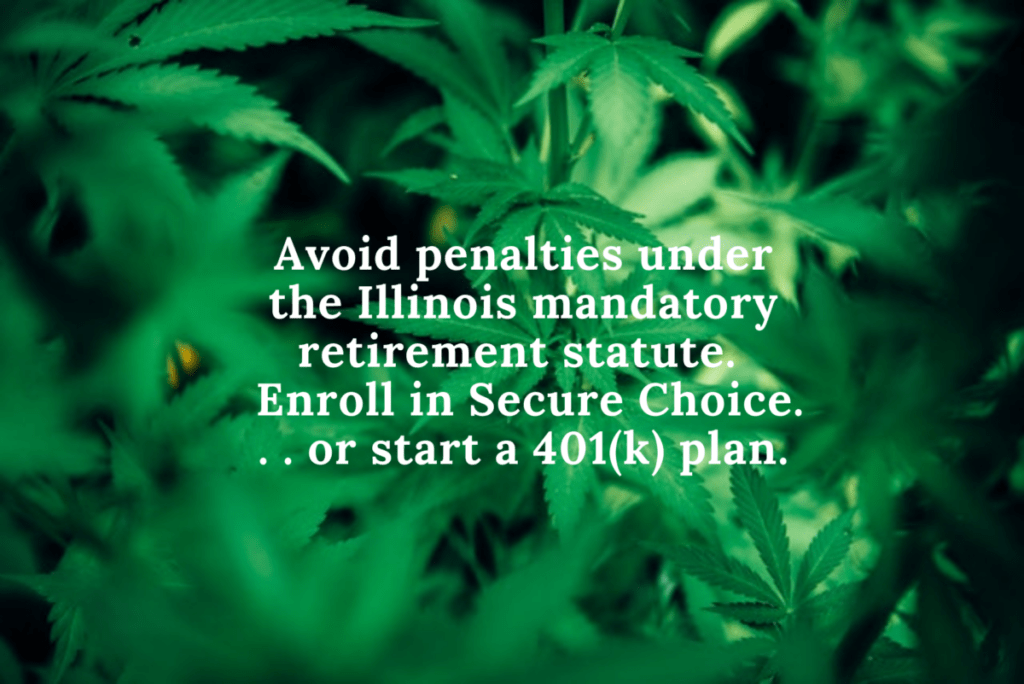The Illinois Secure Choice Mandated Retirement Program May Mean Penalties to the State’s Cannabis Industry
Even cannabis companies in Illinois won’t be able to avoid the state’s mandate to provide some type of retirement program to their employees. If you fit this description:
[You] are an entity engaged in a business, industry, profession, trade, or other enterprise in Illinois, whether for profit or not for profit, that (i) has at no time during the previous calendar year employed fewer than 25 employees in the State, (ii) has been in business at least 2 years, and (iii) has not offered a qualified retirement plan, including, but not limited to, a plan qualified under Section 401(a), Section 401(k), Section 403(a), Section 403(b), Section 408(k), Section 408(p), or Section 457(b) of the Internal Revenue Code of 1986 in the preceding 2 years. See 820 ILCS 80/1 — the Illinois Secure Choice Savings Program Act (“Secure Choice”).
Then, the deadline has passed for Illinois cannabis companies, and you are subject to penalties by your state.

What is the Illinois Secure Choice, As Applied to Cannabis Companies and Mandated Retirement Plans?
As noted above, employers in Illinois with at least 25 employees must comply with the Illinois’ Secure Choice or offer employees an employer-sponsored retirement plan. Adopted in 2015, Secure Choice requires an employer to withhold automatically five percent of each employee’s after-tax compensation (up to the $6000 Roth IRA limit for 2020, as adjusted annually by the Internal Revenue Service). Then, the employer must remit the withheld amounts to Secure Choice.
Enrollment for large employers with at least 500 employees was in December 2018; for employers with 100-499, July 2019; and for employers with 25-99, November 2019. In other words, if you have been operating for at least two years with 25 employees, your deadline for establishing an employer-sponsored plan has passed. At this point, if you haven’t registered for Secure Choice and you haven’t established a 401(k) plan (for example only), then you are exposed to a penalty of $250 per employee for the first year, and $500 per employee for each subsequent year.
The deadline for cannabis companies to enroll in Illinois’ Secure Choice OR establish a retirement plan (such as a 401(k)) has passed. . . penalties run up to $500 per employee, per year.
The Illinois mandate re: retirement savings affects CANNABIS companies, too.
Does the Illinois Secure Choice and Retirement Mandate Exempt Cannabis Companies? If Not, What Can Be Done?
Does the Secure Choice IRA program exempt cannabis companies? Except with respect to size (under 25 employees) or years of operation (fewer than two years), cannabis companies are not exempt from Illinois’ mandatory retirement requirement. A quick “Control F” search for the word “cannabis” or “marijuana” through the text of the applicable law would confirm that. Moreover, there is nothing in the Secure Choice FAQs that shows that the Illinois statute excludes cannabis companies.
As already noted, cannabis companies that didn’t act by the appropriate date are exposed to penalty under Secure Choice. To prevent future and further penalty, however, and to be in belated compliance with the Illinois mandate for a retirement program, a cannabis company can adopt a 401(k) plan (or other qualified retirement plan).
Is a 401(k) Plan a Good Alternative to the Retirement Program Offered Under the Illinois Secure Choice IRA?
Is a 401(k) plan a good alternative to the Secure Choice for a cannabis company? It is. While there are other retirement plans (e.g., 401(a) and 403(b) plans), the more commonly-known 401(k) plan is a good retirement plan choice for cannabis companies trying to comply with Illinois’ mandate and to offer one that most employees readily recognize. A 401(k) plan allows a cannabis company input in designing the terms of the plan (eligibility, age of participating, length of minimum service, vesting, employer contributions, etc.). For example, a cannabis company might want to match employee contributions.
As another example, maybe the cannabis company might want to allow profit sharing. Or, the cannabis company might want to help select the investments into which its employees will put their money. Consequently, a 401(k) plan might be more suitable for a cannabis company who wants to have control in the design of its ultimate retirement plan.
Can Cannabis Companies Participate in a 401(k) Plan?
[The material below comes from similar sections from a post I recently authored regarding California’s retirement mandate. See here.]
Cannabis remains illegal under the federal law of the Controlled Substances Act. However, under the federal laws of the Internal Revenue Code (through which the Department of Treasury enforces its federal laws) and the Employee Retirement Income Security Act (“ERISA,” through which the Department of Labor enforces its federal laws), cannabis companies can sponsor and/or participate in 401(k) plans. For an exploration through those federal laws and how cannabis companies can have 401(k) plans, see “Once and For All: Internal Revenue Code and ERISA Say Cannabis 401k Plans Can Exist” and “Issues for Cannabis Companies to Consider When Sponsoring Retirement Plans.”
What Are the Benefits of a Cannabis Company Starting Its Own 401(k) Plan?

There are federal tax credits available to a cannabis company that starts its own 401(k) plan
Last year, President Trump signed the Further Consolidated Appropriations Act, 2020 into law on December 20, 2019. That law provides comprehensive retirement plan legislation in over a decade: the Setting Every Community Up for Retirement Enhancement (SECURE) Act. Most relevant to any company starting a 401(k) or other retirement plan is the federal tax credit that the SECURE ACT offers to businesses with 100 employees or fewer.
Remember: A federal tax credit reduces tax liability dollar for dollar, whereas a federal tax deduction reduces the amount of taxable income. Taxable income, in turn, is used to calculate tax liability. Tax credits are generally more valuable because they reduce federal tax liability (i.e., the amount owed to the federal government). Tax deductions, on the other hand, reduce tax liability by the tax rate for every dollar of the deduction.
A cannabis company can qualify for a federal tax credit of $5500/year (for three years) for its 401(k) retirement plan.
Under the SECURE ACT, any company — including a cannabis company — can get up to $5,000 annually in a federal tax credit in starting or participating in a new 401(k) plan. Moreover, if the 401(k) plan has an automatic enrollment feature (where employees are put right into the 401(k) plan, unless and until they opt out), then there is another $500 annual federal tax credit.
Thus, a cannabis company could be entitled to $16,500 in federal tax credits over a three-year period for offering a retirement plan to its employees.
There are HR benefits for a cannabis company to have a 401(k) plan
In all industries, whether cannabis or non-cannabis, 401(k) plans are known to help with recruiting, hiring, and retention of employees. It is a nice perk to have, and one that can be put into place to keep a cannabis company competitive with overall compensation packages.
Moreover, subject to Section 280E, a cannabis company’s contribution of employee money and match to a 401(k) plan are “deductible.” That is, contributions are permissible “costs of goods sold” adjustments. Treas. Reg. Section 1.263A-1(e)(3)(ii). [The Editor recommends a good tax accountant familiar with inventory accounting.] Further, amounts get to grow income-tax free inside of a trust, and the trust pays no income taxes itself.
As for the 401(k) trust (where assets are held separate from the cannabis company’s business assets), company creditors — even with the cannabis company in bankruptcy — cannot make a successful claim on retirement plan assets. See U.S. Department of Labor, “FAQs about Retirement Plans and ERISA,” p. 13, June 1, 2020.
Finally, if the cannabis company ever terminates its 401(k) plan or if an employee terminates employment, rules under the Internal Revenue Code and ERISA permit the employee to rollover the account balance into another retirement plan or IRA.
Illinois’ Mandatory Retirement Rule is Forcing the State’s Cannabis Industry to Act
In Illinois, the deadline has passed to conform to the state’s mandate for retirement programs. Now, cannabis companies with 25 or more employees, in operation for at least two years, must comply. To stave off the accumulation of even more penalties from the state, those companies who have not registered with Secure Choice should do so. Else, it is really time for the state’s cannabis companies to consider how a specifically-tailored 401(k) plan can help their employees with retirement savings.
***
Jewell Lim Esposito, Esq. has practiced ERISA and Tax for almost three decades. She is a partner at the law firm FisherBroyles, LLP. The information contained herein is provided for informational purposes only and should not be construed as legal advice on any subject matter.

